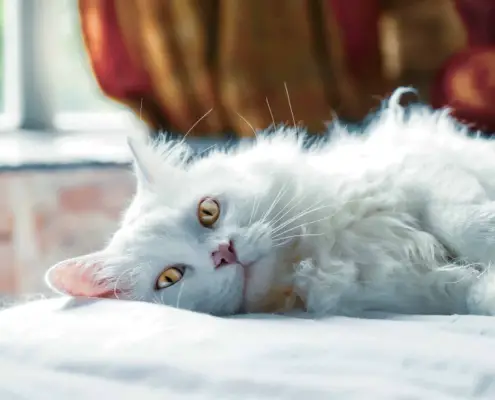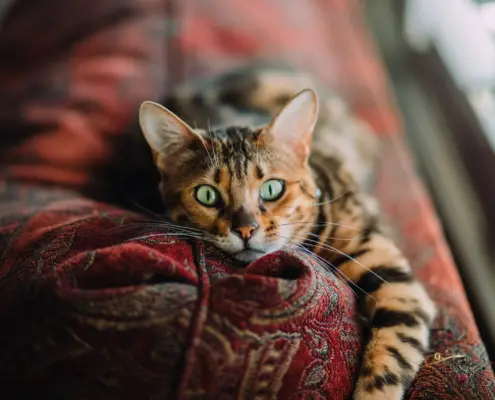
When it comes to our feline friends, ear issues are a common occurrence. Cats are prone to various ear problems that can cause discomfort and even affect their overall health. Understanding these issues is crucial for every cat owner. This section will delve into the most common ear issues seen in cats.
One prevalent ear problem in cats is ear mites. These tiny parasites can infest a cat’s ear canal, leading to intense itching, irritation, and even infection. Another common issue is otitis externa, which refers to inflammation of the external ear canal. This can be caused by allergies, bacterial or fungal infections, or the accumulation of excessive wax and debris. Additionally, cats can develop ear polyps or tumors, which can obstruct the ear canal and lead to hearing loss.
Causes of ear issues in cats
To effectively prevent and treat ear issues in cats, it is essential to understand their underlying causes. One primary cause is poor hygiene. Cats that are not regularly groomed may accumulate dirt, debris, and excessive wax in their ears, creating an environment conducive to infections. Another common cause is allergies. Cats can be allergic to various substances, such as certain foods, pollens, or environmental irritants. Allergies can trigger inflammation in the ears, leading to discomfort and infection. Additionally, ear issues can arise from underlying medical conditions, such as hormonal imbalances or autoimmune disorders.
Symptoms of ear issues in cats
Recognizing the symptoms of ear issues in cats is crucial for early detection and prompt treatment. Cats experiencing ear problems may display a range of signs. These can include excessive scratching or rubbing of the ears, shaking or tilting of the head, a foul odor emanating from the ears, redness or swelling of the ear canal, and a dark, waxy discharge. Cats may also show signs of discomfort when their ears are touched or exhibit a loss of balance. It is important to closely observe these symptoms in order to provide timely intervention.
Preventing ear issues in cats
Prevention is always better than cure, and the same holds true for ear issues in cats. By implementing a few preventive measures, cat owners can significantly reduce the likelihood of their feline companions developing ear problems. Regular ear cleaning should be a part of every cat’s grooming routine. This involves gently wiping the ears with a veterinarian-approved solution and cotton balls. It is also important to maintain a clean living environment, free from excessive dust and allergens. Furthermore, feeding cats a balanced diet that supports their overall health and immune system can help prevent ear issues.
Treating ear issues in cats
When it comes to treating ear issues in cats, a multi-faceted approach is often necessary. Depending on the specific problem, treatment may involve medication, topical ointments, or even surgery. For ear mites, a veterinarian will prescribe appropriate medications to eliminate the parasites. In cases of otitis externa, treatment may involve cleaning the ears, administering antibacterial or antifungal medications, and managing any underlying allergies. Ear polyps or tumors may need to be surgically removed. It is important to follow the veterinarian’s advice and complete the prescribed treatment regimen for optimal results.
Home remedies for ear issues in cats
While professional veterinary care is essential for treating ear issues in cats, there are some home remedies that can provide temporary relief or support the healing process. One such remedy is the use of warm compresses to soothe inflammation and facilitate the removal of debris. Natural solutions, like diluted apple cider vinegar or coconut oil, can be used to clean the ears and prevent the growth of bacteria or fungi. However, it is important to note that these remedies should only be used after consulting with a veterinarian to ensure they are safe and suitable for your cat’s specific condition.
When to see a veterinarian
While some minor ear issues in cats can be managed at home, it is crucial to know when to seek professional veterinary care. If your cat’s ear issues persist or worsen despite home remedies, it is time for a visit to the veterinarian. Additionally, if your cat shows signs of severe pain, hearing loss, or a sudden change in behavior, immediate veterinary attention is necessary. A veterinarian will be able to diagnose the underlying cause of the ear issues and provide appropriate treatment.
Tips for cleaning your cat’s ears
Regular ear cleaning is an important aspect of cat care, and doing it correctly can make a significant difference in preventing ear issues. Here are some tips to ensure safe and effective ear cleaning for your feline companion:
- Use a veterinarian-approved ear cleaning solution and cotton balls.
- Gently lift your cat’s ear flap and apply a few drops of the cleaning solution.
- Massage the base of the ear to distribute the solution and dislodge any debris.
- Use a clean cotton ball to wipe away the solution and any loosened debris.
- Avoid inserting cotton swabs or any sharp objects into your cat’s ear canal.
- Reward your cat with treats and praise after each successful ear cleaning session.
Other ear-related problems in cats
Apart from the common ear issues discussed earlier, cats can experience a range of other ear-related problems. These may include congenital abnormalities, such as a malformed ear canal, which can cause recurring infections. Vestibular disease is another condition that affects the inner ear and can lead to balance problems and disorientation in cats. Additionally, certain breeds of cats, such as the Scottish Fold, may be prone to genetic conditions that affect the structure or function of the ears. Recognizing these less common ear problems is essential for early intervention and appropriate treatment.
Conclusion
Cats are susceptible to various ear issues that can cause discomfort and affect their overall well-being. By understanding the common causes, symptoms, and preventive measures, cat owners can play an active role in keeping their feline companions’ ears healthy. Regular ear cleaning, prompt veterinary attention, and a balanced diet are all important factors in preventing and treating ear issues in cats. Remember, when it comes to your cat’s ears, being proactive and attentive can go a long way in solving the mystery of ear issues and ensuring your cat’s comfort and happiness.
If you enjoyed my article, I would appreciate you sharing it with your network.

Sima Ndlebe
Sima writes for CatBuzz. He is interested in Cats, Health and Fitness, and Entrepreneurship.
Published: 12 October 2023
Related Articles
Disclaimer
The content found on CatBuzz.org is presented on an "as is" basis and is intended for general consumer information and education purposes only. Any utilization of this information is voluntary and solely at the user's own risk.
None of the articles or content should be regarded as, or used in place of, veterinary medical advice, diagnosis, or treatment. The information provided on the website is purely for educational and informational intentions and should not be considered a substitute for professional guidance from a veterinarian or other qualified expert. The articles are designed to inform consumers about veterinary healthcare and medical matters that may impact their cat's daily life. It should be noted that this website and its services do not constitute the practice of any form of veterinary medical advice, diagnosis, or treatment. CatBuzz.org explicitly disclaims any liability for any direct or indirect damages or losses that may arise from the use of or reliance on the information contained within the content.
Consumers must consult a veterinarian, veterinary specialist, or another qualified veterinary healthcare provider when seeking advice regarding their cat's health or medical conditions. It is important not to ignore, avoid, or postpone seeking medical advice from a veterinarian or other qualified veterinary healthcare provider solely based on information obtained from this website. If you believe that your cat may be experiencing a medical issue or condition, it is imperative to promptly contact a qualified veterinary healthcare professional.




